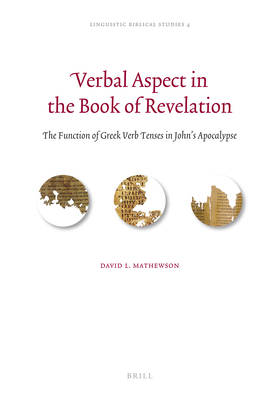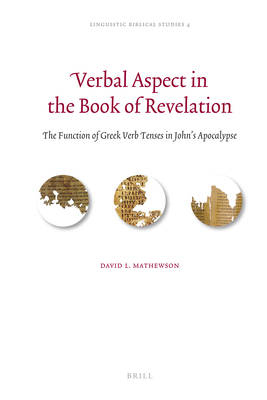
Bedankt voor het vertrouwen het afgelopen jaar! Om jou te bedanken bieden we GRATIS verzending (in België) aan op alles gedurende de hele maand januari.
- Afhalen na 1 uur in een winkel met voorraad
- In januari gratis thuislevering in België
- Ruim aanbod met 7 miljoen producten
Bedankt voor het vertrouwen het afgelopen jaar! Om jou te bedanken bieden we GRATIS verzending (in België) aan op alles gedurende de hele maand januari.
- Afhalen na 1 uur in een winkel met voorraad
- In januari gratis thuislevering in België
- Ruim aanbod met 7 miljoen producten
Zoeken
Verbal Aspect in the Book of Revelation
The Function of Greek Verb Tenses in John's Apocalypse
David L Mathewson
€ 219,95
+ 439 punten
Omschrijving
The book of Revelation is well-known for its grammatical infelicities. More specifically, Revelation exhibits apparently "odd" use of Greek verb tenses. Most attemtps to describe this "odd" use of verb tenses start with the assumption that Greek verb tenses are primarily temporal in meaning. In order to explain Revelation's apparent violation of these temporal values, scholars have proposed some level of semitic influence from the Hebrew tense system as making sense of this "odd" use of tenses. However, recent research into verbal aspect, which calls into question this temporal orientation, and suggests that Greek verb tenses grammaticalize aspect and not time, has opened up new avenues for explaining the Greek verb tense usage in Revelation. This book applies verbal aspect theory to tense usage in Revelation and focuses on how the tenses, as communicating verbal aspect, function within sections of Revelation.
Specificaties
Betrokkenen
- Auteur(s):
- Uitgeverij:
Inhoud
- Aantal bladzijden:
- 212
- Taal:
- Engels
- Reeks:
- Reeksnummer:
- nr. 4
Eigenschappen
- Productcode (EAN):
- 9789004186682
- Verschijningsdatum:
- 26/07/2010
- Uitvoering:
- Hardcover
- Formaat:
- Genaaid
- Afmetingen:
- 165 mm x 246 mm
- Gewicht:
- 498 g

Alleen bij Standaard Boekhandel
+ 439 punten op je klantenkaart van Standaard Boekhandel
Beoordelingen
We publiceren alleen reviews die voldoen aan de voorwaarden voor reviews. Bekijk onze voorwaarden voor reviews.









